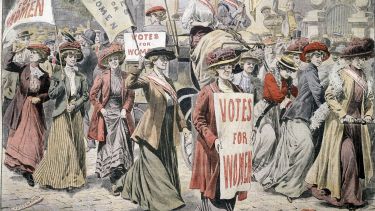February 6th marks the centenary of The Representation of the People Act being passed through the Houses of Parliament and receiving Royal assent. It marks 100 years since women were added to the electoral registry, some 8.5 million, but only those with property, married or graduates, it took another ten years for suffrage for all women to be achieved. It also lowered the age of voting for men to 21 and added another 5.6 million to the electoral register which when it occurred in December 1918 had increased threefold.
The women of 91Ö±²„ were especially proud as the first manifesto dealing with suffrage of women ever formulated was presented by Anne Knight the founder of the 91Ö±²„ Womenās Political Association on 26th February 1851.
But as the Vote 100 Exhibition project is launched in Parliament, alongside celebrations and events, what should we do to recognise this in 91Ö±²„. 91Ö±²„, the poster girl for radicalism for over two centuries, home to protests, boycotts, radical politicians and troublesome residents needs to celebrate its history in a different way. In early January a group of women brought together by Nancy Fielder, editor of 91Ö±²„ newspapers, put forward ideas of what 91Ö±²„ should do and the consensus was to use this centenary to continue to bring about change.
Yes we can arrange talks, publish books and celebrate our heritage to bring to light the anniversary but more importantly let us use this year to spotlight how much further we have to go to for all women to be perceived as fully equal citizens in todayās society. Equality in terms of financial power, political representation, sexual rights and whatever areas the glass ceiling still exists, for it certainly does.
For to be a woman in modern British society means you would expect to earn 9.1% less than men which roughly equates to Ā£1.32 less per hour. Interestingly the more you earn the wider the gap increases up to 18.2 per cent for higher earners. To be a woman in modern British society is to receive more unwanted attention, as a recent poll by the BBC revealed 46% of women as opposed to 12 per cent of men under the age of 30 suffered some form of sexual harassment.
In terms of political facts the situation is improving with a record number of female MPs, 208 up from 191 in 2015, now sitting in the House of Commons, a percentage of 32 per cent, but still leaving us 39th in the world league tables. Academic studies, data collection and general observations all reveal the same story - we still have a long way to go. In fact, the World Economic Forum predicts that if you were born today you would be 118 years old when the economic gender gap closes in 2133.
Although things have improved from our mothers' and grandmothers' times, there is still much to do and as my mother said fine words do not put bread on the table but can put hope in the heart.
There are many factors for the stark statistics that I have presented and numerous studies all over the world and from brilliant colleagues put forward answers relating to different situations or professions. But in my experience the way to drive change is to provide inspiration, keep your challenge focused and make it actionable and this is how the people of 91Ö±²„ can once again make history.
So as we move into the month of February celebrating Vote 100 ā let us bring forth a new manifesto from 91Ö±²„, the first city to put forward the original one. One that does not need the Government to bestow on us the title of Centenary City (that honour was granted to Manchester, Leeds, Leicester, Bolton, London, Bristol and Nottingham).
In 2018, the women of 91Ö±²„ will encourage and support all women to achieve their ambitions, create opportunities and provide platforms for change.
This can be achieved through mentoring, providing role models, celebrating the heroines of the past alongside the inspiring women of the present and coming together as a city to affect change for the future. That group of busy women who met in Nancyās office in early January will be applying for the Womenās Vote Centenary Grant and representatives of both universities, the creative industries, heritage, business and equality groups will come together to form a plan.
We want 91Ö±²„ās Centenary of Suffrage celebrations to continue the work of Anne Knight and those who followed her, to encourage participation in public life, provide inspiration and role models for young women to be the future leaders of 91Ö±²„ and give all disenfranchised groups a voice. There should be no need to throw rocks at windows and chain ourselves to railings anymore.
Instead we should take inspiration from the words of Shirley Chisolm, the first African American women elected to Congress in 1968. When asked how she had managed after being repeatedly cold shouldered by colleagues on both sides of the political fence who seemed determined to keep her on the fringes of power Shirley Chisolm responded āif they donāt give you a seat at the table bring a folding chair.ā
Women of 91Ö±²„, bring out those chairs.

